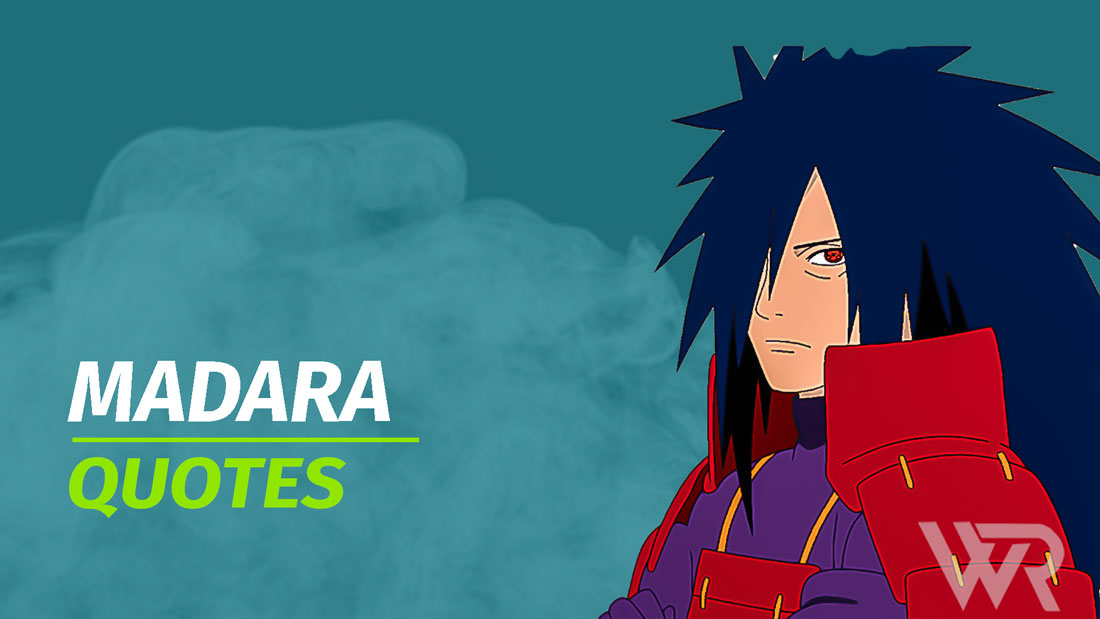Madara Uchiha, a pivotal character from the popular anime and manga series “Naruto,” is renowned for his complex philosophy and profound statements.
As one of the most iconic antagonists in the series, Madara’s character is intricately woven with themes of power, conflict, and the paradoxes of human nature.
His quotes often reflect deep cynicism, a keen understanding of the human psyche, and a critical perspective on societal norms and moralities.
Madara’s words are not mere dialogues; they are reflections of his life experiences, beliefs, and the tumultuous world of the shinobi. They offer insights into his worldview, shaped by his tumultuous history and the relentless pursuit of his goals.
Here are the top Madara quotes.
Top Madara Quotes
“The Reality of Suffering”

“In this world, wherever there is light – there are also shadows. As long as the concept of winners exists, there must also be losers. The selfish desire of wanting to maintain peace causes wars, and hatred is born to protect love.” – Madara Uchiha
Madara’s perspective here reflects a deep understanding of the duality inherent in human experience. He acknowledges that light and shadow, winners and losers, peace and war, love and hatred are all part of a complex interplay.
This quote emphasizes the paradox of human efforts to achieve harmony, where in striving for peace, conflict is often created. It’s a profound reminder of the unintended consequences of our actions and the cyclical nature of human history.
“The Illusion of Control”
“People cannot show each other their true feelings. Fear, suspicion, and resentment never subside.” – Madara Uchiha
In this quote, Madara speaks to the barriers that prevent genuine human connection. He highlights fear, suspicion, and resentment as perpetual undercurrents in human interactions.
This pessimistic view suggests that these negative emotions are ever-present and that they hinder our ability to truly understand and empathize with one another. It’s a commentary on the limitations of human communication and the challenges we face in overcoming our inherent distrust and biases.
“The Futility of Existence”
“When a man learns to love, he must bear the risk of hatred.” – Madara Uchiha
Madara’s words here delve into the vulnerability that comes with love. To love is to open oneself up to the possibility of experiencing hatred, either from others or even within oneself.
This quote speaks to the duality of human emotions, suggesting that love and hate are inextricably linked. It’s a somber reminder of the risks inherent in forming deep emotional connections and the courage required to embrace these risks.
“The Nature of Power”
“Power is not will, it is the phenomenon of physically making things happen.” – Madara Uchiha
This quote challenges the conventional understanding of power as a matter of will or determination. Madara suggests that true power is about the tangible, physical ability to effect change.
This perspective shifts the focus from internal qualities like resolve or ambition to the external, actionable capacity to influence events. It’s a pragmatic view that emphasizes action over intention, highlighting the practical aspects of wielding influence.
“The Inevitability of Conflict”
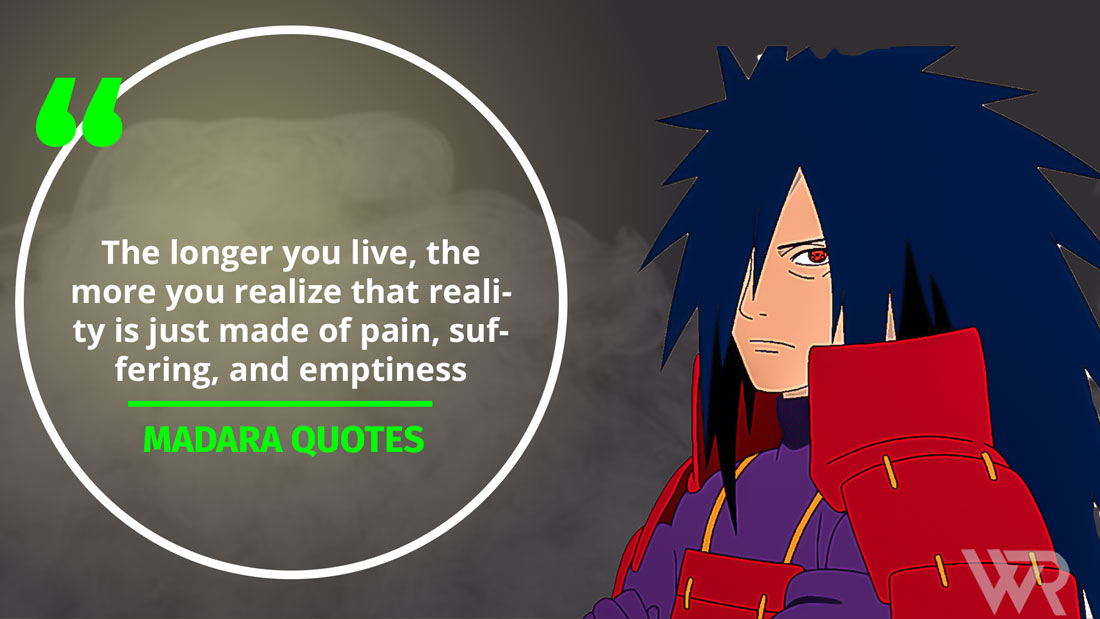
“The longer you live, the more you realize that reality is just made of pain, suffering, and emptiness.” – Madara Uchiha
Madara’s observation here is steeped in nihilism, reflecting a life lived in prolonged conflict. He speaks to a sense of disillusionment with the world, where prolonged exposure to life’s harsh realities leads one to view existence as fundamentally painful and devoid of meaning.
This quote resonates with those who have experienced prolonged hardship, underscoring the weariness and cynicism that can develop over time.
Also Read: Rosanne Rosannadanna Quotes (with Explanation)
“The Cycle of Hatred”
“Love is not necessary; power is the only true necessity.” – Madara Uchiha
In this stark statement, Madara dismisses love as a superfluous emotion, elevating power as the ultimate goal. This view reduces human relationships to transactions of power, overlooking the fundamental human need for emotional connection and support.
It’s a reflection of Madara’s own experiences and choices, which have led him to value strength and control above all else.
“The Burden of Leadership”
“As I walk towards my true dream, I will enjoy fighting with you.” – Madara Uchiha
This quote highlights the paradox of leadership and ambition. Madara acknowledges the solitary path towards his goals, yet he also finds value in the conflict and opposition he encounters.
This perspective suggests that the journey towards one’s ambitions is as significant as the goal itself, with challenges and adversaries providing meaning and enjoyment. It speaks to the complex nature of ambition and the ways in which our goals are intertwined with our interactions with others.
“The Paradox of Peace”
“Would you consider dying together ‘Teamwork’ as well?” – Madara Uchiha
This quote carries a sense of irony and skepticism about the concept of unity and cooperation, especially in the context of conflict and war.
Madara’s rhetorical question challenges the often romanticized idea of camaraderie in battle, suggesting that sometimes, what is seen as teamwork might just be a shared path to destruction. It’s a darkly realistic take on the fates of those caught in the throes of war.
“The Mirage of Truth”
“The concept of hope is nothing more than giving up. A word that holds no true meaning.” – Madara Uchiha
Madara here expresses a deeply cynical view of hope, reducing it to a mere illusion or a form of surrender.
This perspective implies that hope is a distraction from reality, a meaningless concept that people cling to in order to avoid facing the harsh truths of their existence. It reflects a worldview where resignation is seen as more genuine than aspiration.
“The Irony of Freedom”
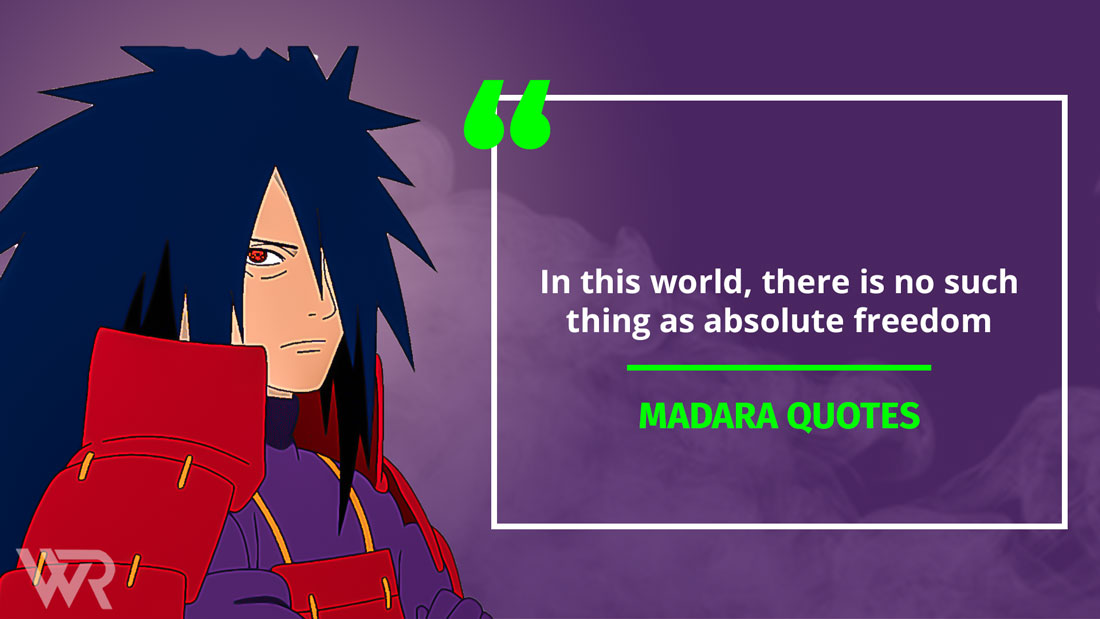
“In this world, there is no such thing as absolute freedom.” – Madara Uchiha
This quote speaks to the inherent limitations and constraints that exist in the world. Madara acknowledges that absolute freedom is an unattainable ideal, suggesting that every choice and action is bound by circumstances, consequences, or societal norms.
It’s a reflection on the nature of freedom and the inevitable restrictions that come with living in a complex, interconnected society.
“The Seduction of Power”
“It seems that you still want to dance but… You will not be able to make steps anymore.” – Madara Uchiha
Madara uses a metaphor of dance to describe the struggle for power and control. This quote implies that while one may desire to continue the struggle or the “dance” of power, there comes a point where they are no longer able to keep up or influence the course of events.
It’s a statement about the limits of individual ability and influence in the grand scheme of things.
“The Illusion of Righteousness”
“The Uchiha is a clan destined for revenge.” – Madara Uchiha
This quote encapsulates the tragic history and destiny of the Uchiha clan as seen by Madara. He views his clan as inherently tied to vengeance, suggesting a cycle of anger and retribution that defines and perhaps even consumes their identity.
It speaks to the broader theme of how history and legacy can predetermine the paths of individuals and groups.
“The Pursuit of Dreams”
“As long as there is light – there are also shadows. As long as the concept of victors exists, there must also be losers. The selfish desire of wanting to maintain peace causes wars.” – Madara Uchiha
This quote revisits the theme of duality but focuses on the pursuit of dreams and ideals. Madara suggests that in striving for something as noble as peace, one inevitably creates conflict.
It’s a philosophical observation about the unintended consequences of pursuing any ideal, no matter how virtuous it may seem.
“The Reality of Choice”
“Wake up to reality! Nothing ever goes as planned in this world. The longer you live, the more you realize that only pain, suffering, and futility exist in this world.” – Madara Uchiha
Here, Madara urges a confrontation with the harsh realities of life. He emphasizes that plans and expectations often fall apart in the face of life’s unpredictability.
This quote is a stark reminder of the suffering and disappointment that are inherent in the human experience, suggesting that understanding and accepting these realities is a part of living.
“The Inescapability of Fate”
“Every human being relies on and is bound by his knowledge and experience to live. This is what we call ‘reality’. However, knowledge and experience are ambiguous, thus reality can become illusion.” – Madara Uchiha
Madara here delves into the philosophical understanding of reality, arguing that it is shaped and often constrained by our personal knowledge and experiences.
He suggests that what we perceive as real is susceptible to the limitations and biases of our own minds, making reality a subjective and potentially misleading concept.
This insight challenges the notion of an objective truth, inviting reflection on the fluidity of perception and the potential for diverse realities shaped by individual experiences.
“The Folly of Ideals”
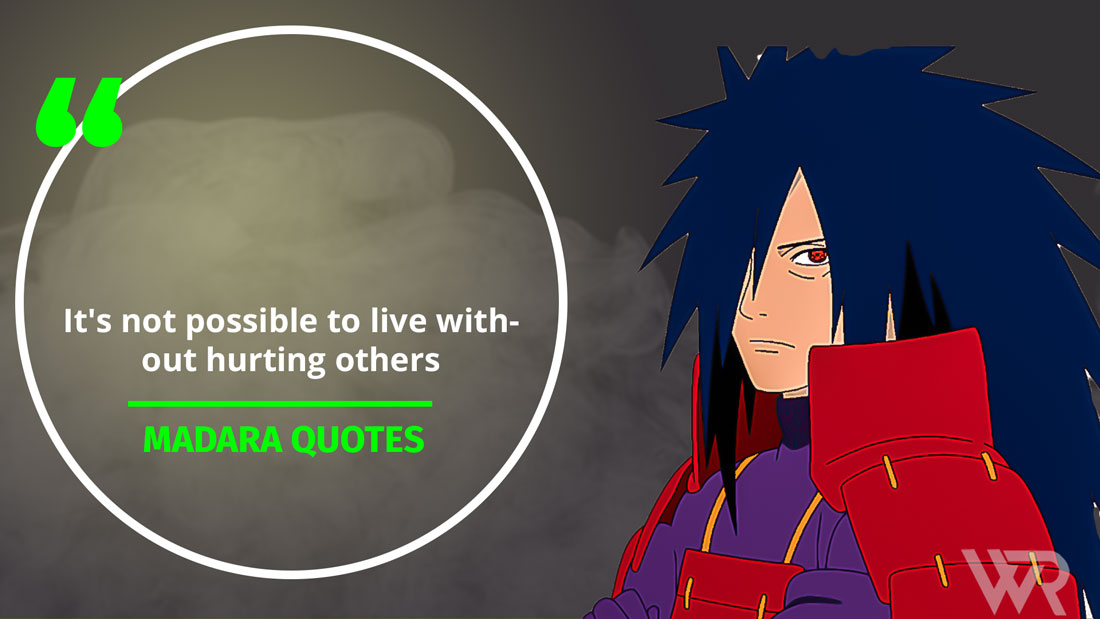
“It’s not possible to live without hurting others.” – Madara Uchiha
This quote touches on the moral complexity of human existence. Madara acknowledges the inevitable harm that comes with living, whether intentional or not.
His statement confronts the idea of moral purity, suggesting that no matter how noble our intentions, our actions invariably affect others, sometimes negatively.
It’s a pragmatic view that encourages a deeper understanding of the consequences of our actions, emphasizing the interconnectedness of human relationships and the unavoidable impact we have on each other.
“The Dichotomy of Strength”
“The true measure of a shinobi is not how he lives but how he dies.” – Madara Uchiha
Madara’s words here reflect a traditional samurai ethos, emphasizing the importance of how one faces death. This quote suggests that the true strength and character of a person, particularly a warrior, is revealed not in the span of their life but in their final moments.
It’s a perspective that values bravery and resolve in the face of mortality, highlighting a cultural reverence for honorable death over a life that may not embody these ideals.
“The Mirage of Change”
“Talking about peace whilst spilling blood, it’s something that only humans can do.” – Madara Uchiha
In this quote, Madara critiques the hypocrisy often inherent in human actions, especially in the context of war and peace. He points out the ironic nature of humans who speak of peace while engaging in violence.
This observation exposes the contradiction between ideals and actions, underscoring a cynicism about human nature and the complexities of political and moral rhetoric.
“The Weight of Dreams”
“When people are protecting something truly special to them, they truly can become as strong as they can be.” – Madara Uchiha
Here, Madara acknowledges the immense power of personal motivation, particularly when it comes to protecting something cherished. This quote suggests that the strength of a person is magnified when they are driven by a deep, personal cause or connection.
It’s a testament to the human capacity for extraordinary feats under the right circumstances, highlighting the significant impact of emotional and personal investment in driving human action.
“The Illusion of Perfection”
“A place where someone still thinks about you is a place you can call home.” – Madara Uchiha
This quote provides a poignant definition of home, one that transcends physical spaces and is rooted in the connections between people.
Madara implies that home is not a location, but a sense of belonging and being remembered or cared for. It’s a reflection on the importance of relationships and emotional bonds in defining our sense of place and security in the world.
“The Paradox of Knowledge”

“The ones who aren’t able to acknowledge their own selves are bound to fail.” – Madara Uchiha
Madara in this statement highlights the importance of self-awareness and acceptance. He suggests that a lack of self-knowledge and an inability to confront one’s own reality are fundamental weaknesses that lead to failure.
This quote underscores the value of introspection and self-understanding, arguing that true success and strength stem from a deep and honest awareness of oneself.
Also Read: Rod Wave Quotes (with Commentary)
“The Duality of Existence”
“Do not improvise what you cannot handle.” – Madara Uchiha
Madara’s cautionary advice here speaks to the importance of understanding and acknowledging one’s limitations.
This quote serves as a reminder that while ambition and improvisation are valuable traits, they must be tempered with a realistic assessment of one’s abilities. Overreaching or taking on more than one can handle often leads to failure or harm.
It’s a pragmatic perspective that encourages self-awareness and careful planning, emphasizing the balance between aspiration and capability.
“The Mirage of Victory”
“The world is not perfect, but it’s there for us, trying the best it can. That’s what makes it so damn beautiful.” – Madara Uchiha
In this rare moment of reflection, Madara acknowledges the inherent flaws of the world while also appreciating its beauty and effort.
This quote contrasts with his usual cynicism, offering a more nuanced view that recognizes the complexity and worth of the world despite its imperfections.
It suggests a deep understanding of the human condition and the world’s attempts to accommodate the myriad needs and desires of its inhabitants. This perspective invites us to appreciate the world’s beauty and effort, even in its imperfection.
“The Complexity of Truth”
“Justice comes from vengeance, but that justice only breeds more vengeance.” – Madara Uchiha
Here, Madara explores the cyclical nature of vengeance and justice. He suggests that while vengeance may be seen as a form of justice by those who seek it, this very act perpetuates further vengeance, creating an endless cycle of retribution.
This quote points to the complexity of moral and ethical decisions, highlighting the difficulty in breaking the cycle of violence once it begins. It’s a commentary on the challenges of achieving true justice in a world where revenge can often be mistaken for it.
“The Burden of Knowledge”
“The road to be the champions is the road of freedom. No, that’s just a lie. That is only the sweet icing on a bitter truth.” – Madara Uchiha
In this statement, Madara criticizes the glorification of certain paths or goals, such as becoming a champion, suggesting that they are often romanticized and not as liberating as they seem.
He implies that what is often portrayed as a journey towards freedom is, in reality, fraught with unseen sacrifices and harsh truths.
This quote offers a more realistic and perhaps cynical view of the pursuit of greatness, emphasizing the cost and the often overlooked darker aspects of such journeys.
“The Irony of Peace”

“In the ninja world, those who break the rules are scum, but those who abandon their friends are worse than scum.” – Madara Uchiha
Madara here comments on the moral codes of the ninja world, highlighting the tension between following rules and maintaining personal bonds.
He suggests that while rule-breaking is frowned upon, forsaking one’s friends is an even greater moral failing. This quote speaks to the value placed on loyalty and relationships in this context, suggesting that personal connections often supersede rigid adherence to rules.
“The Illusion of Freedom”
“It’s not a crime to dream. However, it is stupid to believe that dream will come true by itself.” – Madara Uchiha
Madara emphasizes the importance of action in realizing dreams. He acknowledges the value of dreaming but cautions against the passive expectation that dreams will materialize without effort.
This quote promotes a proactive approach to ambitions, suggesting that while dreaming is important, it must be coupled with determination and hard work to be fulfilled. It’s a blend of idealism and realism, encouraging both aspiration and practicality.
“The Pursuit of Power”
“As long as the concept of winners exists, there must be losers. The selfish desire to maintain peace causes wars.” – Madara Uchiha
Reiterating a theme from his earlier thoughts, Madara reflects on the paradoxical nature of human endeavors. He suggests that the pursuit of victory inevitably creates losers, and the desire for peace can paradoxically lead to conflict.
This quote reveals a cynical view of human nature and the unintended consequences of seemingly noble pursuits. It’s a philosophical musing on the inherent contradictions in human society and the often self-defeating nature of our actions.
“The Relativity of Justice”
“What is justice? What is evil? The winners are justice. The losers are evil.” – Madara Uchiha
Madara challenges the notion of absolute moral values here, suggesting that history and morality are often dictated by those who emerge victorious. His statement implies that the concepts of justice and evil are not fixed but are defined by the perspectives of those in power.
This relativistic view of morality highlights the subjective nature of ethical judgments and the influence of power dynamics in shaping our understanding of right and wrong.
“The Illusion of Permanence”
“Nothing ever really dies. The universe wastes nothing, everything is simply transformed.” – Madara Uchiha
In this quote, Madara touches upon the concept of the perpetual cycle of life and matter. He suggests that death is not an end, but a transformation, aligning with the idea that energy and matter are constantly in flux and cannot be created or destroyed, only changed in form.
This perspective offers a more holistic view of existence, transcending the typical boundaries of life and death.
“The Paradox of Desire”
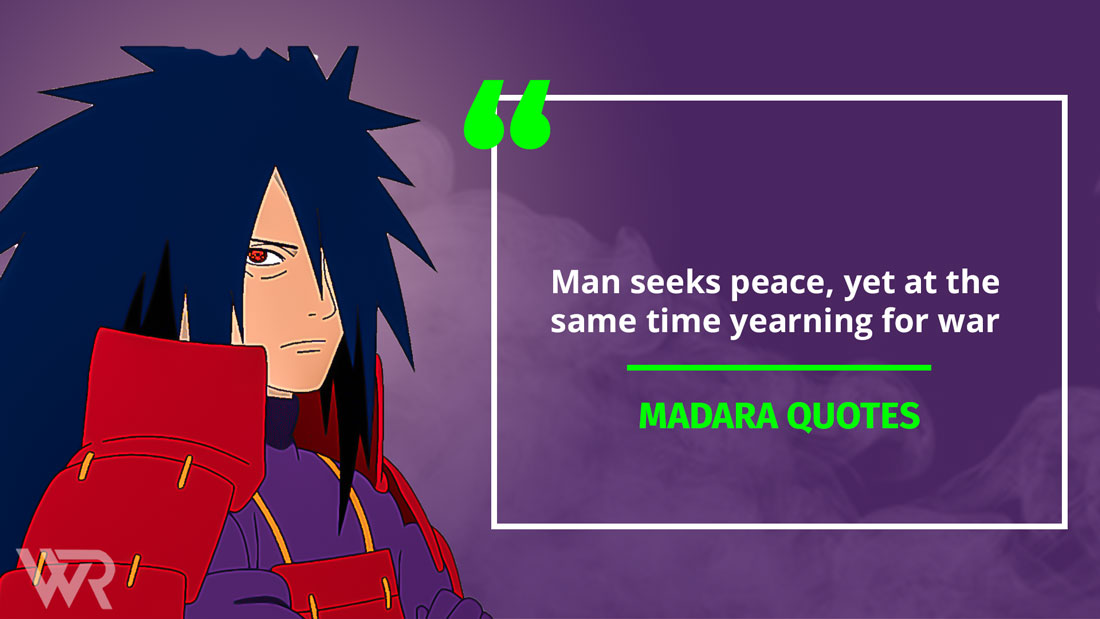
“Man seeks peace, yet at the same time yearning for war.” – Madara Uchiha
Madara reflects on the contradictory nature of human desires in this quote. He observes that while humans inherently seek peace and stability, there is also an intrinsic pull towards conflict and strife.
This contradiction speaks to the complex psychological makeup of human beings, where conflicting desires and impulses coexist, often leading to internal and external conflicts.
“The Nature of True Strength”
“True strength is not about ruling over others, it’s about controlling oneself.” – Madara Uchiha
Contrary to his usual emphasis on power and control over others, Madara here speaks to the concept of self-mastery. He suggests that true strength lies in self-control and discipline, rather than in exerting dominance over others.
This introspective view challenges the traditional notion of strength, placing importance on inner qualities such as self-awareness and restraint.
“The Futility of Escapism”
“Running away will never make you free.” – Madara Uchiha
Madara’s statement here is a stark reminder that avoiding problems or escaping from reality does not lead to true freedom.
He implies that liberation and resolution come from facing challenges head-on, rather than fleeing from them. This quote underscores the importance of confrontation and resilience in overcoming obstacles and achieving a genuine sense of freedom.
“The Complexity of Humanity”
“Humans are nothing but a product of their own history.” – Madara Uchiha
In this quote, Madara reflects on the deterministic view of human nature. He suggests that people are largely shaped by their past experiences and the history they’ve lived through.
This perspective points to the significant influence of one’s background and experiences in forming their identity, beliefs, and behaviors, emphasizing the role of historical and personal contexts in shaping individuals.
“The Irony of Wisdom”
“Only the foolish accept the realities of this world.” – Madara Uchiha
Here, Madara criticizes what he sees as a naive acceptance of the world’s apparent realities. He suggests that wisdom involves questioning and challenging the status quo, rather than passively accepting it.
This quote advocates for a critical and reflective approach to understanding the world, highlighting the value of skepticism and the pursuit of deeper truths.
“The Inevitability of Change”
“Times change, people change, and so must I.” – Madara Uchiha
Madara acknowledges the constant flux of time and its impact on individuals and societies. This quote reflects an understanding that adaptation is a necessary part of life and survival.
It suggests a willingness to evolve in response to changing circumstances, highlighting the inevitability and importance of personal growth and flexibility in the face of life’s uncertainties.
“The Irony of Perception”
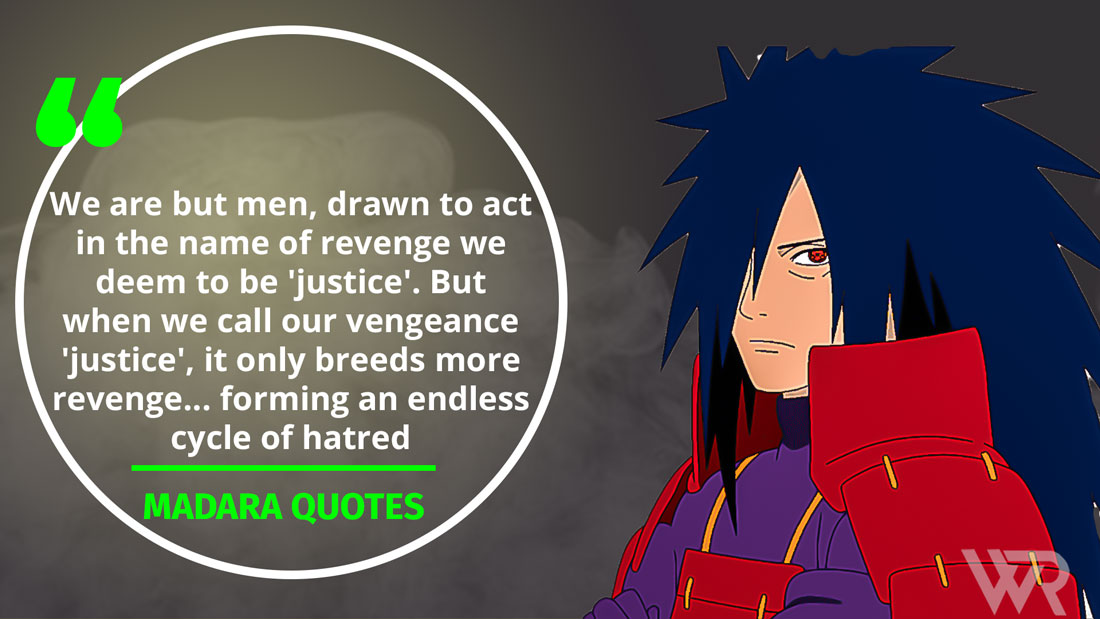
“We are but men, drawn to act in the name of revenge we deem to be ‘justice’. But when we call our vengeance ‘justice’, it only breeds more revenge… forming an endless cycle of hatred.” – Madara Uchiha
Here, Madara touches on the cyclical nature of revenge and justice. He observes the human tendency to label personal vendettas as acts of justice, which in turn incites further vengeance.
This quote emphasizes the subjective nature of justice and the destructive patterns formed by conflating revenge with righteousness.
“The Reality of Ambition”
“The road to hell is paved with good intentions and the world of shinobi is ruled by hatred.” – Madara Uchiha
Madara reflects on the unintended consequences of noble aims, suggesting that even well-meaning actions can lead to disastrous outcomes.
This quote also comments on the inherent violence and conflict within the shinobi world, driven by deep-seated animosities. It’s a somber view of the realities of ambition and the often brutal nature of the world of ninjas.
“The Paradox of Knowledge”
“As long as you don’t give up, there will always be salvation.” – Madara Uchiha
In this rare moment of optimism, Madara suggests that persistence is key to overcoming adversity. This quote proposes that salvation and success are attainable for those who refuse to surrender in the face of challenges.
It’s a message that encourages resilience and the belief that steadfastness can lead to positive outcomes.
“The Illusion of Control”
“The stronger you get, the more you realize just how fragile you are.” – Madara Uchiha
Madara reflects on the paradox of strength and vulnerability. He suggests that with increased power and ability comes a greater awareness of one’s own limitations and fragility.
This quote highlights the irony that often the more capable we become, the more acutely we understand our weaknesses and the impermanence of our strength.
“The Burden of Leadership”
“A leader must be willing to carry out the will of the departed, for those who remain behind.” – Madara Uchiha
Madara speaks to the responsibilities of leadership, emphasizing the duty to honor and continue the legacies of those who have passed.
This quote suggests that a leader’s role extends beyond the present, encompassing the aspirations and wills of those who came before. It’s a perspective that highlights the weight of history and tradition in leadership.
“The Futility of Conflict”
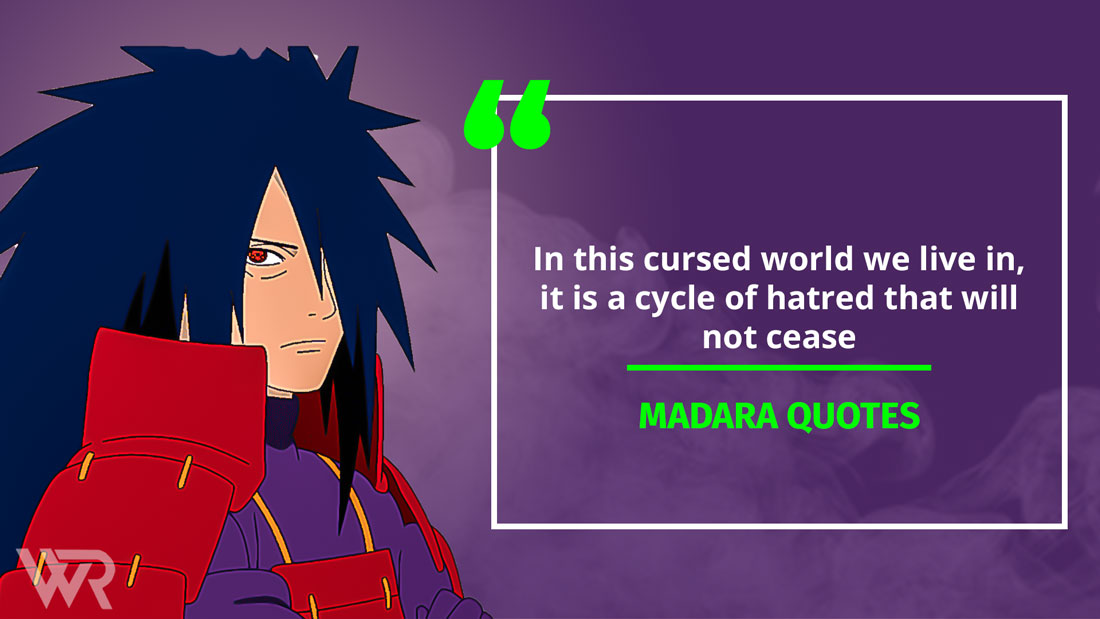
“In this cursed world we live in, it is a cycle of hatred that will not cease.” – Madara Uchiha
Madara expresses a fatalistic view of the world, seeing it as trapped in a perpetual cycle of hatred and conflict. This quote conveys a sense of despair and inevitability about the continuous nature of animosity and strife in human society.
It reflects a deep cynicism about the possibility of lasting peace and the entrenched patterns of hostility that seem to define human interactions.
“The Essence of Reality”
“Reality is merely an illusion, albeit a very persistent one.” – Madara Uchiha
In this contemplation, Madara delves into the nature of reality, suggesting that what we perceive as real may in fact be an illusion, shaped by our perceptions and experiences.
This philosophical view challenges the notion of an objective, unchanging reality, proposing instead that our understanding of the world is fluid and subjective, influenced by our individual and collective consciousness.
“The Duality of Human Nature”
“Humans are creatures that always betray their own expectations.” – Madara Uchiha
Madara reflects on the unpredictability and inconsistency inherent in human behavior. He observes that people often act in ways that contradict their own expectations or beliefs, highlighting the complex and sometimes contradictory nature of human motivations and actions.
This quote underscores the difficulty in fully understanding or predicting human behavior, given the multifaceted and often conflicting aspects of our nature.
“The Paradox of Wisdom”
“Wisdom and virtue are not always found in the light, but often in the shadows.” – Madara Uchiha
Here, Madara suggests that true wisdom and virtue may not always be found in obvious or traditionally esteemed places.
Instead, they can often be discovered in unexpected, perhaps darker or overlooked, aspects of life. This perspective challenges conventional views of morality and wisdom, inviting a broader, more inclusive understanding of where valuable insights and virtues can reside.
Also Read: Kevin Gates Quotes (with Commentary)
Final Thoughts
Madara Uchiha‘s quotes from the “Naruto” series offer a rich tapestry of philosophical insights, delving into the complexities of human nature, the ambiguities of morality, and the relentless cycle of conflict and change.
His words, often steeped in cynicism and realism, challenge readers and viewers to think deeply about the world around them and the inherent contradictions within it.
Madara’s character, embodying both the wisdom and the follies of his experiences, serves as a mirror reflecting the multifaceted nature of humanity.

